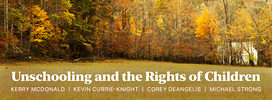Corey DeAngelis correctly points to the nonexistence of “random assignment studies…linking unschooling or homeschooling to student outcomes.” He points to several problems that would come with producing such studies. First, randomly assigning families to unschool is problematic and would violate the very aversion to coercion that typifies unschooling. Also, specifying the types of outcomes we want to compare between unschoolers and “conventional schoolers” is problematic, as unschooling is often based on the idea that learners grow in their own ways at their own rates.
Studies on unschooling, of course, do exist but tend to be small-scale qualitative studies. They either use survey data where past or present unschoolers report on their unschooling experience, or where researchers detail how learners learn outside of schooled structures. These studies carry the limitations of having small and possibly non-representative sample sizes and methodologies where the subjects or investigators are engaged in potentially biased reporting.
I am not as troubled by this as Corey might be. While I’d love to see larger studies done, that will have to wait until unschooling becomes a larger-scale phenomenon. At this point, sadly, what unschoolers must show—what these qualitative studies do show—is that unschooling is a possibility. Culturally, we have imbibed the message that kids simply cannot learn productive things without imposed curriculum, grades, classrooms with teachers, and so on. I’d love to see whether unschooling really does work with larger populations, and maybe someday, those studies can be done. But for now, I want to show people that unschooling is possible, that kids can learn outside of schooled structures. Even if we can say about these qualitative studies that they just relay the experiences of a special kind of learner from a special, non-representative, kind of family, we can answer: “Maybe, but that special kind of kid clearly doesn’t need school as much as you think they do! And if so, maybe other special kinds of kids don’t either.”

